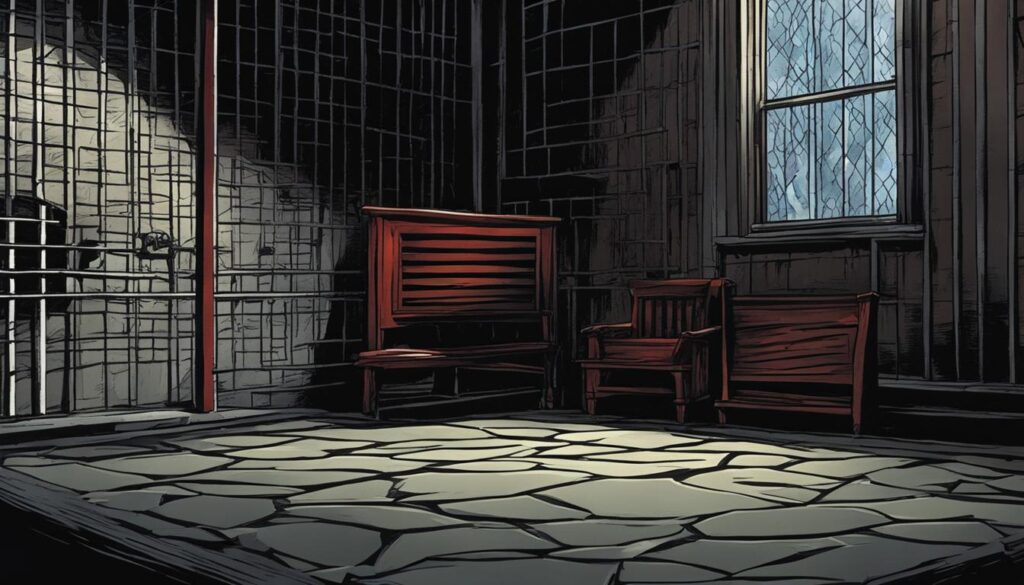Stephen King, the master of horror, brings his readers on a thrilling ride in his apocalyptic novel, “The Cell.” King’s unique writing style and vivid imagination shine through in this intense tale of technology gone wrong.
In “The Cell,” readers are introduced to a world where a mysterious signal is broadcast over all cell phones, turning people into mindless, violent creatures. Survivors must navigate this dangerous new world and fight to keep their humanity intact.
Key Takeaways:
- “The Cell” by Stephen King is an apocalyptic thriller that explores the dangers of technology.
- The novel follows a group of survivors as they fight to stay alive in a world overrun by mindless, violent creatures.
- King’s unique writing style and vivid imagination make “The Cell” a must-read for horror fans.
- The book has received both positive and negative reviews, but its impact on the apocalyptic thriller genre cannot be denied.
- Fans of “The Cell” may also enjoy other works by Stephen King with similar themes or writing styles.
About the Author – Stephen King
Stephen King is a prolific American author, known for his contributions to the horror and thriller genres. Born on September 21, 1947, in Portland, Maine, King began his writing career at a young age, selling his short stories to magazines and newspapers. He achieved critical and commercial success with his debut novel, “Carrie,” published in 1974. Since then, he has written countless novels and short stories, including “The Shining,” “IT,” and “Misery,” many of which have been adapted into films and TV series.
King’s writing style is characterized by his ability to create vivid and suspenseful narratives, often centred around complex characters facing supernatural or psychological threats. Over the years, his works have garnered numerous awards and honours, cementing his status as a literary icon.
King’s impact on the literary world cannot be overstated. With over 350 million copies of his books sold worldwide, he has influenced countless authors and readers alike. His books have been translated into over 40 languages, making him one of the most widely read authors of all time.
Despite his success, King remains dedicated to his craft, often engaging with fans on social media and continuing to write and publish new works. As one of the most respected and acclaimed authors of our time, Stephen King’s legacy is sure to endure for generations to come.
Plot Summary of The Cell by Stephen King
In “The Cell”, an unknown phenomenon known as the Pulse strikes all cell phone users, turning them into mindless, violent zombies. The story follows artist Clayton Riddell as he tries to survive and reunite with his family amidst the chaos.
Together with a small group of survivors, including a young teenager named Alice and an ex-soldier named Tom, Clayton navigates the dangerous streets of Boston, encountering both friend and foe along the way.
As they progress, Clayton discovers that the Pulse has awakened dormant parts of the brain, imbuing some survivors with psychic powers. These powers prove to be both a blessing and a curse as they try to fend off the zombie-like “phoners” and find a way to reverse the effects of the Pulse.
“It was a house full of love…and that love might have saved them, but for the Pulse.”
The novel builds to a thrilling and suspenseful climax as Clayton and his group face off against a powerful individual known as The Raggedy Man and race against time to prevent the world from being consumed by the madness of the Pulse.
Characters in The Cell by Stephen King
In “The Cell” by Stephen King, a diverse cast of characters navigates a world thrown into chaos by a mysterious signal broadcast through all cellphones. The protagonist, Clayton Riddell, is a struggling graphic novelist who finds himself forced to survive in this new reality alongside a group of fellow survivors. Riddell takes on the role of leader and protector, driven by his desire to find his estranged son in this new world.
Other notable characters include Alice Maxwell, a teenage girl who joins Riddell’s group after losing her family to the “pulse”; Tom McCourt, a former soldier who becomes Riddell’s right-hand man; and Jordan, a young boy who proves to be a vital member of the group with his technical skills.
The characters in “The Cell” are complex and well-developed, each with their own motivations and flaws. King expertly weaves their stories together to create a gripping tale of survival and humanity in the face of apocalypse.
Themes in The Cell by Stephen King
Stephen King’s “The Cell” explores various themes, including technology, survival, and human nature. The novel depicts a world where technology is both a source of convenience and a means of destruction. The author highlights the dangers of being too reliant on technology, especially in a world where it can be easily manipulated by sinister forces.
The theme of survival is also prominent in “The Cell.” The characters must face various challenges and dangers, including hostile survivors and mutated creatures, as they journey towards safety in a post-apocalyptic world. The novel showcases the characters’ resilience and resourcefulness as they navigate the challenges of survival.
Finally, “The Cell” delves into the depths of human nature, exploring the complex emotions and behaviors that arise in times of crisis. The novel highlights the fragility of social bonds and the ease with which they can be broken under extreme circumstances, as well as the potential for human cruelty and violence.
Overall, Stephen King’s “The Cell” offers a sobering account of a world ravaged by technological disaster and the human struggles that arise in the face of adversity.
Writing Style of Stephen King in The Cell
Stephen King’s writing style in “The Cell” showcases his mastery of the horror genre through his use of suspense, vivid descriptions, and gruesome scenes. Through his gripping prose and character development, King expertly brings his apocalyptic world to life, creating a world that both horrifies and captivates readers.
King’s use of suspense keeps readers on the edge of their seats as they follow the characters on their dangerous journey. His vivid descriptions create a visceral experience for readers, allowing them to truly immerse themselves in the world of “The Cell.” Additionally, King’s ability to craft fully-formed and complex characters further adds to the intensity of the story, provoking a strong emotional response from readers.
Overall, King’s writing style in “The Cell” solidifies his reputation as a master of the horror genre. His unique blend of suspense, horror, and character development make “The Cell” a thrilling and captivating read for fans of Stephen King and the apocalyptic thriller genre.

Critical Reception to The Cell by Stephen King
Upon its release, The Cell by Stephen King garnered mixed reviews from critics. While some praised King’s exploration of technology’s dangerous power, others criticized the book’s disjointed plot and inconsistent pacing.
Writing for The New York Times, Janet Maslin lauded King’s ability to create a “taut and scary” narrative, but admitted that the book’s ending felt “hurried and unsatisfying.” Similarly, Publishers Weekly praised King’s “impressive attention to detail,” but ultimately found the book to be “overlong” and “confusing.”
Despite the mixed critical reception, The Cell still managed to captivate audiences with its haunting premise and adrenaline-fueled action. Many readers were drawn to King’s visceral descriptions and raw emotional power, which elevated the book beyond its flaws.
Impact of The Cell by Stephen King
Since its publication in 2006, The Cell by Stephen King has had a significant impact on the literary world and the apocalyptic thriller genre. The novel received mixed reviews from critics, with some praising King’s ability to create an intense and suspenseful story, while others criticized the plot and pacing.
Despite the mixed reviews, The Cell has still managed to make an impact on popular culture, with the book’s premise of a viral outbreak that turns cell phone users into mindless killers captivating audiences. The novel’s influence can be seen in various forms of media, including television shows, movies, and video games.
This book drew me in from the beginning and did not let go! Stephen King has a way of building such elaborate worlds that seem so realistic and uncomfortable at the same time. His writing style is unmatched, and the way he can build suspense through the simplest of actions is pure genius.
Moreover, The Cell has inspired other writers to explore similar themes and motifs within the apocalyptic thriller genre. Stephen King’s influence on the literary world is undeniable, and he continues to pave the way for future writers and creators.
Similar Works by Stephen King
If you enjoyed “The Cell” by Stephen King, you may also like:
- The Stand: A post-apocalyptic novel that explores the battle between good and evil.
- The Mist: An intense horror novella about a group of people stranded in a grocery store during a mysterious fog.
- Cell: Another novel by Stephen King that deals with the consequences of technology run amok.
- Under the Dome: A town is suddenly and inexplicably covered by an invisible dome, leading to chaos and violence.
Stephen King is known for his ability to create gripping and intense stories that keep readers on the edge of their seats. Fans of “The Cell” will enjoy his other works that feature similar themes and writing styles.
Film Adaptation of The Cell by Stephen King
Stephen King’s thrillers have often inspired film adaptations, and “The Cell” is no exception. There had been rumors about a film adaptation of the novel for many years, ever since its publication in 2006.
After numerous false starts and changes in development teams, the film adaptation of “The Cell” was finally entering production, with John Cusack set to star. Eli Roth was initially attached to direct the film, but now it is being directed by Tod Williams.
The film is set to be released in 2022, featuring John Cusack as Clay Riddell, the protagonist in the book. The story has been adapted for the screen by writer Adam Alleca, with an updated plot that incorporates contemporary technology such as smartphones and social media.
Fans of Stephen King and “The Cell” will be eagerly awaiting the release of this film adaptation. With its terrifyingly realistic portrayal of a world destroyed by technology, it is sure to be a hit among horror and thriller enthusiasts.
Conclusion
Overall, “The Cell” by Stephen King is a thrilling and thought-provoking novel that explores the horrors of technology and the complexities of human nature in the face of an apocalyptic event. King’s writing style, use of suspense and vivid descriptions, creates a chilling atmosphere that draws readers in and keeps them engaged until the very end. Despite mixed critical reception, “The Cell” has had a lasting impact on the apocalyptic thriller genre and remains a must-read for fans of Stephen King and the genre as a whole. For those who enjoyed “The Cell,” other recommended works by King include “The Stand,” “The Mist,” and “Under the Dome.” While there have been rumors of a film adaptation, nothing has been confirmed as of yet.



